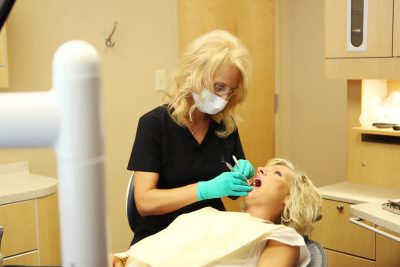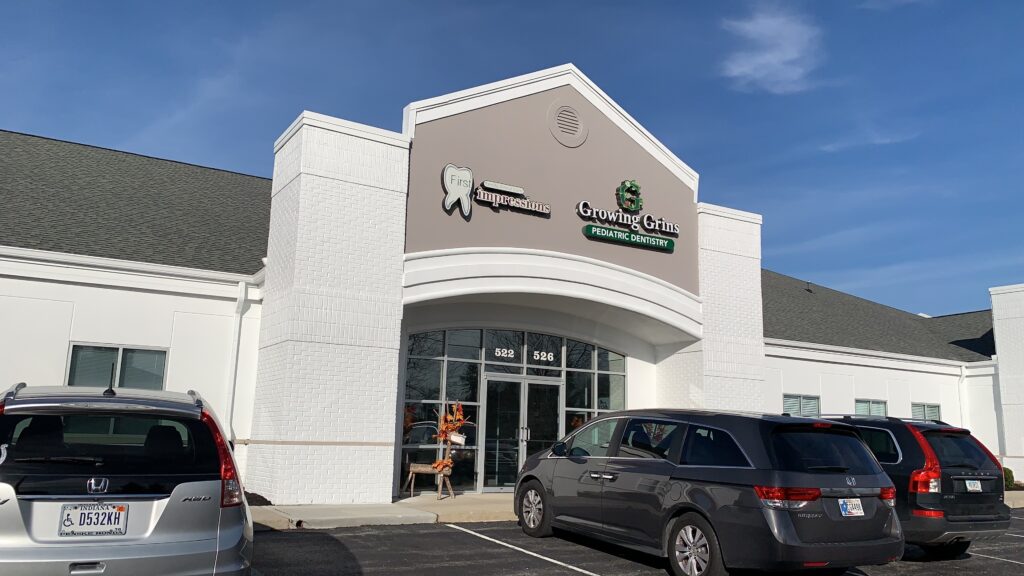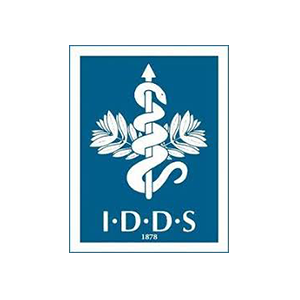Dental Crown & Dental Bridge
 A dental crown, also known as a dental cap, is a prosthetic device that is designed to cover and encase a damaged or weakened tooth. It is a custom-made tooth-shaped cap that fits comfortably over the entire visible portion of the tooth, extending from the gums to the chewing surface. Dental crowns are typically made from materials such as porcelain, ceramic, metal alloys, or a combination of these materials.
A dental crown, also known as a dental cap, is a prosthetic device that is designed to cover and encase a damaged or weakened tooth. It is a custom-made tooth-shaped cap that fits comfortably over the entire visible portion of the tooth, extending from the gums to the chewing surface. Dental crowns are typically made from materials such as porcelain, ceramic, metal alloys, or a combination of these materials.
The primary purpose of a dental crown is to restore the strength, functionality, and appearance of a tooth that has been extensively damaged, decayed, or weakened. When a tooth is severely decayed, fractured, or has undergone root canal therapy, a crown is often recommended by dentists to protect and support the remaining tooth structure. Crowns can also be used for cosmetic purposes to improve the shape, size, and color of a tooth, enhancing its overall aesthetics. So if you’re dealing with missing teeth that need to be replaced, First Impression Family Dental Care is the place to be!
On the other hand, a dental bridge is a permanent restoration used to replace missing teeth. It consists of an artificial tooth, called pontics, which is held in place by dental crowns on either side. The crowns, called abutments, are attached to the natural teeth or dental implants adjacent to the gap created by the missing tooth or teeth. The pontic fills in the space left by the missing teeth, restoring the function and aesthetics of the dental arch.
Dental bridges can be made from various materials, including porcelain-fused-to-metal, ceramic, or zirconia, depending on the desired appearance and strength. The type of dental bridge used may vary depending on the location of the missing tooth, the condition of the surrounding teeth, and the patient’s specific needs.
Dental bridges offer several benefits, including restoring proper chewing and speaking functions, preventing the shifting of adjacent teeth into the gap, maintaining the natural facial structure, and improving the smile’s appearance. With proper care and regular dental check-ups, dental bridges can provide long-lasting results, allowing individuals to enjoy a complete and functional set of teeth. Schedule your first appointment with our team and achieve your new smile!
Dental Crown and Dental Bridge Procedure
 The process of getting a dental crown usually involves multiple visits to the dentist and tooth preparation. During the first visit, the tooth is prepared by removing any decay or damaged tooth portions, and it is reshaped to accommodate the crown. An impression or digital scan of the prepared tooth is taken, which is then sent to a dental lab where the custom crown is fabricated. In the meantime, a temporary crown may be placed to protect the tooth. Once the final crown is ready, it is cemented onto the prepared tooth during a subsequent appointment, providing long-lasting and highly durable fillings.
The process of getting a dental crown usually involves multiple visits to the dentist and tooth preparation. During the first visit, the tooth is prepared by removing any decay or damaged tooth portions, and it is reshaped to accommodate the crown. An impression or digital scan of the prepared tooth is taken, which is then sent to a dental lab where the custom crown is fabricated. In the meantime, a temporary crown may be placed to protect the tooth. Once the final crown is ready, it is cemented onto the prepared tooth during a subsequent appointment, providing long-lasting and highly durable fillings.
The process of getting a dental bridge typically requires multiple dental visits. In the initial visit, the abutment teeth are prepared by removing a portion of their enamel to accommodate the crowns. Similar to the process of getting a dental crown, impressions or digital scans are taken and sent to a dental laboratory, where the implanted supported bridge is custom-made. During the second visit, the temporary bridge may be placed, and the final bridge is cemented or bonded into place once it is ready.
Same-Day Dental Crowns in Westfield
At our dental practice in Westfield, we are proud to offer same-day dental crowns, providing our patients with efficient and convenient solutions for their dental needs. Gone are the days of waiting for weeks with a temporary crown. With our state-of-the-art technology and skilled professionals, we can deliver permanent porcelain crowns in as little as two hours.
One of the key aspects of our same-day crown service is the utilization of digital scanning technology. Instead of messy and uncomfortable traditional impressions, we use a digital scanner to create a precise 3D image of your teeth. This advanced imaging technology ensures accuracy and eliminates the need for uncomfortable impression materials in your mouth.
To create your custom dental crown, our highly trained team uses the digital scan to design a permanent crown that perfectly matches the shape, size, and color of your natural teeth. This digital process allows for precise customization, ensuring a seamless and natural-looking result. Once the design is finalized, our in-house milling machine fabricates the crown from high-quality porcelain material, known for its durability and aesthetic appeal.
While you wait comfortably in our office, our advanced milling machine crafts your crown with exceptional precision. This efficient process eliminates the need for off-site fabrication, reducing the waiting time typically associated with traditional crown procedures. Once the crown is ready, our skilled dentists carefully evaluate the fit and appearance before permanently bonding it to your tooth.
Here’s a short video on the same-day crown process.
Caring for Your Dental Crowns and Dental Bridges

Caring for your dental crown and dental bridge is essential to ensure their longevity and maintain good oral health. While dental crowns typically last between five and eight years, the right care and maintenance can significantly extend their lifespan. Here are some important practices to consider:
Practice good oral hygiene
Brush your teeth at least twice a day with a soft-bristled toothbrush and fluoride toothpaste. Be gentle around the crown area to avoid damaging the restoration. Remember to clean all tooth surfaces, including the gum line where the crown meets the tooth.
Avoid harmful habits
Certain habits can shorten the life expectancy of your dental crown. Avoid teeth grinding or clenching, as it can put excessive pressure on the crown and cause it to chip or crack. Additionally, refrain from chewing on hard foods, ice, or objects like pens or fingernails, as they can also damage the crown.
Clean between your teeth
Cleaning the areas between your teeth is crucial, especially around the crown. Plaque buildup in these spaces can lead to extensive decay and gum disease. Regularly floss your teeth using dental flosses or interdental cleaners like specially shaped brushes or sticks. These tools help remove plaque effectively from the crown area where the gum meets the tooth.
Attend regular dental check-ups
Visit your dentist for routine check-ups and professional cleanings. Your dentist will examine the condition of your dental crown or dental bridge, identify any potential issues, and provide necessary treatments or adjustments. Regular check-ups allow early detection of problems and help maintain the health and integrity of your dental restorations.
Be mindful of dietary choices
Certain foods and beverages can pose a risk to dental crowns and bridges. Avoid sticky or chewy foods that can dislodge or damage the restoration. Limit your consumption of sugary snacks and beverages to prevent tooth decay and preserve the health of the underlying natural tooth structure.
Protect against trauma
If you participate in sports or activities that carry a risk of dental injury, it’s advisable to wear a mouthguard. A mouthguard can provide protection for your dental restorations and help prevent damage caused by sudden impacts or accidents.
Maintain good oral hygiene
Taking care of your dental crowns and bridges goes hand in hand with maintaining good overall oral health. This includes regular brushing, flossing, and rinsing with an antimicrobial mouthwash. A balanced diet, sufficient water intake, and avoiding tobacco products also contribute to your oral well-being.
Use a non-abrasive toothpaste
Choose a toothpaste that is non-abrasive to protect the ceramic material of your dental crowns or bridges. Abrasive toothpaste can wear down the surface of the restoration over time, making it more prone to staining and damage.
Consider a mouthwash for added protection
Using an antimicrobial mouthwash can help control bacteria in your mouth and reduce the risk of gum disease or tooth decay. Look for a mouthwash that is alcohol-free and specifically formulated for daily use.
Our Partners



